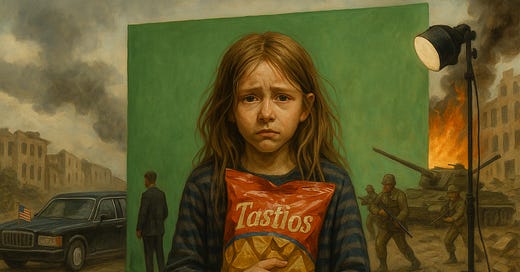Mansplaining Wag the Dog
How a Fake War Became the Realest Script of Our Lives
By Chris Abraham
Look, I know what this sounds like. Some guy—probably named Chris—is about to explain a movie you’ve never seen like it’s a decrypted intelligence brief. And yes. That’s exactly what this is. This is a mansplain. Not the handsy barstool kind. The breakroom kind. The annoying-but-right coworker kind. The kind that starts with a smug sigh and ends with you understanding the world differently, even if you pretend you don’t. You’re welcome.
Because if you want to understand the 21st century—if you want to make any damn sense of drone footage with lo-fi beats, meme warfare, algorithmic outrage cycles, TikTok testimonies, and viral proxy wars with cinematic production values—you have to understand one very specific piece of 20th-century fiction: Wag the Dog.
The plot is simple: The President, just weeks before re-election, gets caught diddling a Girl Scout—or at least someone Girl Scout-adjacent. The public’s going to find out. It’s about to blow up. But instead of facing the story head-on, his handlers do something very American: they distract. They hire a Hollywood producer to help them manufacture a fake war. The location? Albania. Why Albania? Because, as the fixer says, "They have to have something we want." Like what? "To destabilize the region." Perfect.
So begins the show.
They produce fake news clips. Invent heroes. Stage rescue operations. Write an anthem. Even cast an orphan girl in front of a green screen holding a bag of Tostitos (which becomes the symbol of the struggle). No Albanians are harmed. No troops are deployed. No bullets are fired. But the American public eats it up. Because when it comes to war, we don’t need blood. We need spectacle.
It’s a movie about a movie being treated like reality. And we have never left it.
False Flags and Inflatable Tanks
Wag the Dog didn’t invent the concept of manufactured war. It just turned it into a screenplay. The real playbook goes back decades:
Gulf of Tonkin, 1964: An "attack" that never really happened, but was used to launch Vietnam.
Operation Northwoods, 1962: A never-executed plan to commit false flag acts on U.S. soil and blame Cuba.
Nayirah Testimony, 1990: A Kuwaiti girl (later revealed to be the ambassador’s daughter) claimed Iraqi soldiers were killing babies. Total fiction. Massive impact.
Jessica Lynch, 2003: Her rescue was scripted like a Marvel movie, edited by the Pentagon.
9/11: No, we’re not going full truther. But yes, there were drills happening that day. Yes, the media story was set before the smoke cleared. Yes, the Patriot Act was pre-written.
We used to use cardboard tanks. Now we use TikTok.
We Don’t Do Empires Anymore—We Do Cinematics
There was a time America planted flags. Now we plant hashtags. We used to name battles after cities. Now we name them after feelings. Operation Iraqi Freedom. Enduring Freedom. Inherent Resolve. They sound like scented candles. They are branding exercises masquerading as military campaigns.
Just like Wag the Dog, the real action happens behind the scenes—in press rooms, in editing bays, in green rooms before the Sunday shows.
This isn’t about who’s in charge. Republican, Democrat, Deep State, Meme Lords—all of them know that if you can hijack the narrative, you control the timeline. Truth is optional. Believability is currency. And the news cycle is a meat grinder that turns scandal into confetti as long as you keep feeding it content.
Why Gen Z (and Half of Millennials) Don’t Know This
Because they were raised in The Truman Show. Born post-9/11. Raised on curated feeds, vibe-based politics, and algorithmically enforced amnesia. They think fake news was invented by Trump. They think QAnon is where it starts.
But Wag the Dog was deepfake before deepfake. It was psyop-as-satire. It was meme magic before Reddit. The entire war was made in a studio. The reality was just a side effect.
Welcome to the Soft Power Empire
We don’t conquer nations. We destabilize them. We don’t occupy territory. We occupy narratives. You think USAID is about feeding babies? You think color revolutions happen organically? You think Ukraine was about borders and not about pipelines and NATO expansion?
Wag the Dog was prophetic. Because now, there is no off switch. There is no line between the war room and the writer’s room. Every journalist is a combatant. Every influencer is a morale officer. Every green screen is a potential battlefield.
And the Dog Keeps Wagging
Trump vs. Biden. Gaza. Ukraine. Taiwan. Every news alert, every AI-generated tearjerker, every viral drone video—ask yourself: Is this Albania? Is this the bag of chips in the rubble? Who benefits? Who’s off-screen?
We’re not watching history. We’re watching a trailer for a film that doesn’t exist.
Coming Soon:
Mansplaining The Fog of War
Robert McNamara explains how you can kill 100,000 civilians and still sleep at night.Mansplaining Being There
A gardener with nothing to say becomes president because he vibes right.Mansplaining The Lives of Others
Come out, come out, we know who you are. The surveillance state goes full UI.Mansplaining Dr. Strangelove
Or: How I learned to stop worrying and love the bureaucratic annihilation spiral.Mansplaining Idiocracy
When the water gets replaced with Brawndo—and the think tank becomes a Monster Energy ad.Mansplaining Brazil
A man is buried alive in paperwork, ductwork, and feedback forms.Mansplaining Network
A man has a nervous breakdown live on air and becomes the first content creator monetized by a collapsing empire.Mansplaining Alphaville
Lemmy Caution navigates a dystopia where love is outlawed and logic is fascism in drag.
Stay tuned.
Subscribe. Share. Throw a shoe. It’s all theater anyway.
Footnote: Inspired by Wag the Dog (1997), directed by Barry Levinson, written by David Mamet and Hilary Henkin. Every absurdity in this piece is a toned-down version of something that has already happened.





